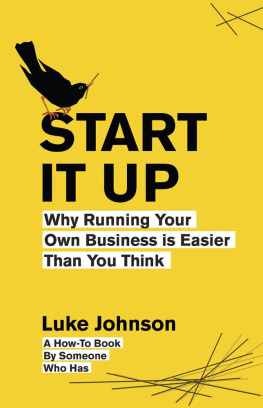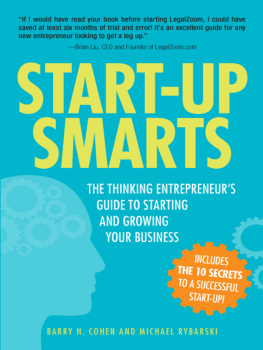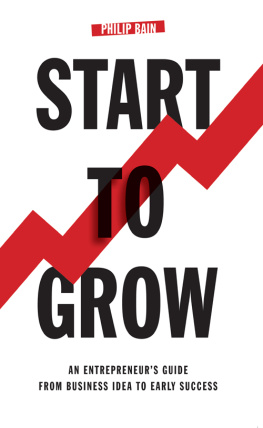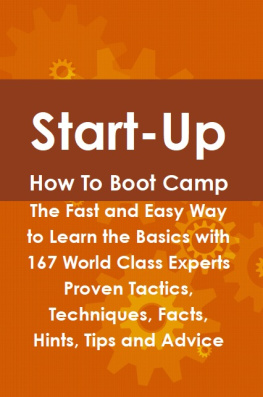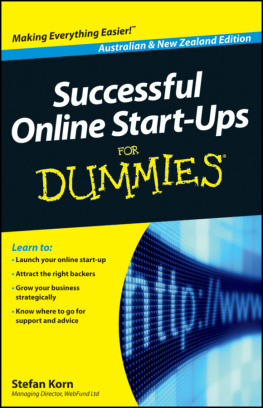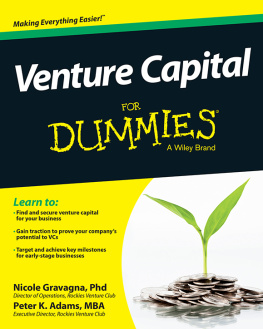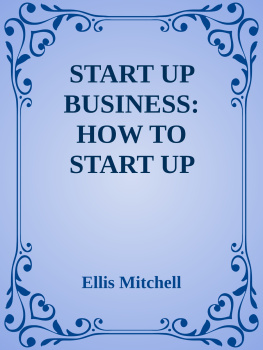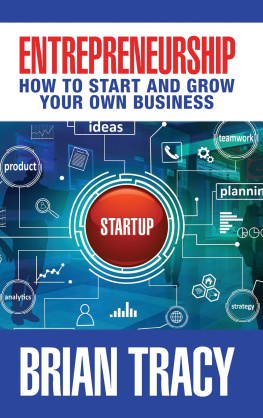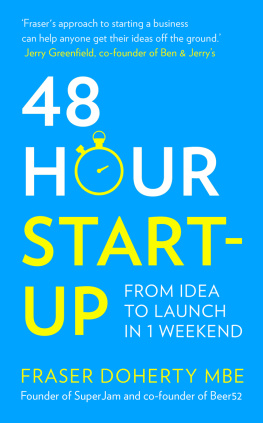
LUKE JOHNSON
START IT UP
Why Running Your Own Business is Easier Than You Think

Contents
Part 1
BEGINNINGS
Part 2
PEOPLE
Part 3
POINTS OF STYLE
Part 4
THE CAPITAL PURSUIT
Part 5
FORMULAS
Part 6
THE CYCLE
Part 7
THE ENTREPRENEUR AT LARGE
START IT UP
Luke Johnson is one of Britains most successful entrepreneurs, with an estimated personal fortune of 120 million. He is Chairman of Risk Capital Partners and the Royal Society of Arts, and a former Chairman of Channel 4 Television. He writes columns for the Financial Times and Management Today. In the 1990s he was Chairman of PizzaExpress, which he grew from twelve restaurants to over 250; he also founded the Strada pizzeria chain and owns Giraffe and Patisserie Valerie. He lives in London and is married with three children.
www.LukeJohnson.org
To Daisy, Felix and Ralph
certainly my best ever start-ups
All mens gains
are the fruit of
venturing
Herodotus
Preface
This book is aimed at anyone who has ever thought about starting or buying a business. It is for one-man bands, as well as those who are running big companies. It is for all the dreamers who want to control their own destiny and make some money perhaps a lot while theyre at it.
This is not a comprehensive manual, like a school textbook. It has practical advice, but what I really want the book to do is to inspire you to go out and create a new enterprise. The possibilities are endless. Whenever I meet someone who runs their own company, or read the biography of an entrepreneur, I am fascinated by the haphazard way in which they ended up being their own boss. The journey is rarely planned: it is not a career with a structure and sets of qualifications, like medicine or architecture.
Rather, entrepreneurs create their own career path by providing something new that customers will buy at a profit. Sometimes that product or service is genuinely innovative but often it is a conventional offering yet delivered better, cheaper or in a different place.
Some are happy to be simple freelancers and avoid the burden of employing staff. Others are more ambitious and want to build a major concern. Whoever they are, the journey they have chosen is unlikely to be the easy path but for many it will offer much more excitement and satisfaction than the drudgery of working for others.
I think entrepreneurs are the unsung heroes of our time. They generate the jobs and taxes that keep our society civilized. They risk going broke, or maybe just working one hundred hours a week and earning very little. They battle through recessions, regulation and competition to satisfy our wants. I salute their efforts, ingenuity and commitment. This book is dedicated to them: because without dynamism and bold thinking, we would all be immeasurably poorer. I hope one or two of these chapters help motivate and provide a little guidance to the warrior entrepreneurs of our time.
PART 1
Beginnings
A few failures first
Let me start with a few small, frothy matters such as failure, ambition, money, happiness and success.
The older I get, the more I ponder the true meaning of those words, and the harder I find it to define them.
Lets start with failure. Now, I much prefer the word setback. It has a more positive ring to it. But whatever you call it, Ive had my fair share of business failures. Anyone who tells you theyve never made any mistakes or had any losers is either lying, in denial, or headed for a really big fall.
Most entrepreneurs prefer to talk about their winners. That is natural and healthy: probably all entrepreneurs are ultimately optimistic and believe in a brighter future.
But in a curious way the most useful examples in life come from the things that dont work. That is how you learn to handle the pitfalls; by recovering from disaster you become more resilient and ideally better prepared for the next time.
So for a change, I thought Id start this how-to business book with the odd how-not-to and a few please-donts. What follows are a handful of the most painful commercial lessons Ive learned over the last two decades in the trenches.
These are some but sadly not all of the business mistakes Ive made. To save blushes and possible legal actions I wont reveal the names of all the companies concerned, but they all happened and they were all expensive for me, anyhow.
One of the early ones was a showbiz company. It was a catalogue of errors. I believed the published accounts, but unfortunately the books were cooked: the profits and assets were overstated and the liabilities understated. The audit partner served as a non-executive director perhaps that had something to do with it. Worse, I didnt realize the company depended heavily on a tiny number of customers, one of whom soon took their business elsewhere.
I had invested just ahead of a recession. I thought the business was sound. But economic cycles are much bigger than any business or industry.
Just as we all think were brilliant in a boom, everyone gets done over in a bust. Its only a question of degree.
Another less than wonderful experience was an automotive business. It was essentially a one-product company, but we installed a chief executive from a vastly larger concern. Bad move.
He expected secretaries, company cars, operating officers, first-class travel and all the rest. What he didnt do was actually run the business. He had risen so far he forgot how to do things like close a sale, read a balance sheet or negotiate with suppliers.
A third miserable time was my involvement in a construction company. I failed to notice the chief executive was having a slow-motion breakdown thanks to his wifes alcoholism.
He hid invoices in drawers and turned a blind eye to subordinates who were committing widespread fraud. All pretty grim for a high-volume, low-margin game like the building trade.
And then there was the restaurant abroad.
America remains a wonderful place for a British restaurateur to lose large sums of money. I did my bit in New York a few years ago. I had the foolish idea of opening a branch of our Belgian food chain Belgo there.
Our restaurant looked fantastic, the food and service were excellent, but the project was doomed from the start. As a bad omen, Manhattan union chiefs installed a giant inflatable rat outside the construction site before we opened for using non-union labour to build the place. We misjudged US costs, tastes, pricing and staff.
We also misjudged the finances of our joint venture partner, who promptly went broke. We fatally underestimated just how competitive the restaurant business is in other countries, and were amazed at how much lower expected restaurant returns are in the USA compared to the UK.
Altogether a sobering and expensive experience, despite all the strong Belgian beer we sold.
In the early 1990s I helped a couple of young entrepreneurs buy an oven-making business called Pavailler in Valence, France, for a symbolic one franc. It was a substantial enterprise but was losing 10 per cent on turnover for its then owner, APV.
We proposed a significant downsizing to make the operation profitable. But when the plans were presented to the local union boss and mayor, it was made clear that we would be arrested and thrown in jail if we attempted such a monstrous course of action.
Next page
